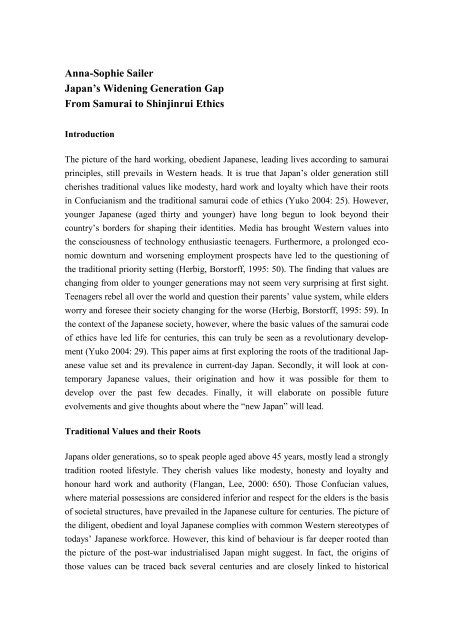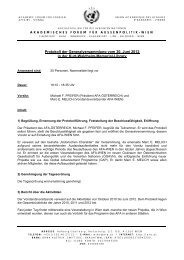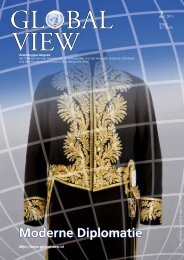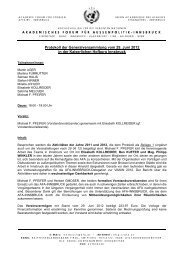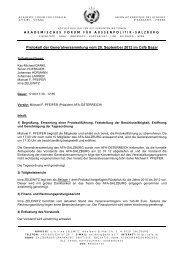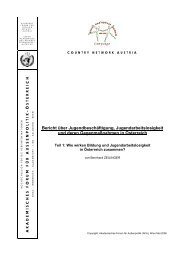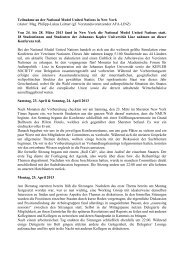- Seite 1 und 2:
GAP-JOURNAL 2012/13 Eine Publikatio
- Seite 3:
3 3 3 Das Global Advancement Progra
- Seite 7 und 8:
7 VORTRAGENDE DES GLOBAL ADVANCEMEN
- Seite 9 und 10:
9 TEILNEHMERINNEN UND TEILNEHMER DE
- Seite 11 und 12:
11 Tina Laaber Das Allgemeine Pensi
- Seite 13 und 14:
13 Julia Ebner Between Growth and R
- Seite 15 und 16:
15 Bilderdes 3. GAP-Jahrgangs 154 K
- Seite 17 und 18:
17 Andreas Thöni Information techn
- Seite 19 und 20:
19 erhöhte. Weiters konnte festges
- Seite 21 und 22:
21 Arbeit bei weitem nicht die Selb
- Seite 23 und 24:
23 Doch nicht nur Studierende folge
- Seite 25 und 26:
25 DerWandel Es ist bekannt, dass e
- Seite 27 und 28:
27 Deutschland, sind besonderes mit
- Seite 29 und 30:
29 nalratsabgeordneten, sowie Dritt
- Seite 31 und 32:
31 werden. Aber auch andere politis
- Seite 33 und 34:
33 zubauen. Besonders der Blick inu
- Seite 35 und 36:
Marie-Theres Bristela Designingasus
- Seite 37 und 38:
37 Thus, energy security, the impac
- Seite 39 und 40:
39 in comparison with 2005 emission
- Seite 41 und 42:
41 schemes for at least adecade. Mu
- Seite 43 und 44:
43 targets, but will fail inachievi
- Seite 45 und 46:
FranzDerler Evolution of theCentral
- Seite 47 und 48:
47 Figure 1: Developmentoftotal ins
- Seite 49 und 50:
49 First Generation Wind PowerMarke
- Seite 51 und 52:
51 obtaining consent is not a main
- Seite 53 und 54:
53 Potential Wind Power Markets Slo
- Seite 55 und 56:
55 Stoerring,Dagmara and FredeHvelp
- Seite 57 und 58:
57 World’s Population with Access
- Seite 59 und 60:
59 health impacts. The Internationa
- Seite 61 und 62:
61 tal protection. In order tobecom
- Seite 63 und 64:
63 sity of accepting future generat
- Seite 65 und 66:
65 portant to foster the enforcemen
- Seite 67 und 68:
67 Guan, D., Liu, Z., Geng, Y., Lin
- Seite 69 und 70:
Jakob Etzel Chances and Challenges
- Seite 71 und 72:
71 It is clear that there needs to
- Seite 73 und 74:
73 universal computing machine, aso
- Seite 75 und 76:
75 for society. Amortisation calcul
- Seite 77 und 78:
77 The interesting thing is that th
- Seite 79 und 80:
79 Parnas,D.L.(1972): “On theCrit
- Seite 81 und 82:
81 Tabelle 1 Einheitenpräfixe Prä
- Seite 83 und 84:
83 größte Energiequelle, sie bewi
- Seite 85 und 86:
85 Elektrizität findet über Kapla
- Seite 87 und 88:
87 Abbildung 3 Struktur derStromerz
- Seite 89 und 90:
89 ARTE (2013): Versenkt und Verges
- Seite 91 und 92:
91 die intergenerationelle Verantwo
- Seite 93 und 94:
93 bringend in Fabriken eingesetzt
- Seite 95 und 96:
95 diesem Zusammenhang die Generati
- Seite 97 und 98:
97 Grafik 4: Entwicklung des Altern
- Seite 99 und 100:
99 Internationales Arbeitsamt (2006
- Seite 101 und 102:
101 Der eroberten Bevölkerung stan
- Seite 103 und 104:
103 “Literature offers one of the
- Seite 105 und 106:
105 gen auf die Translation hatte.
- Seite 107 und 108:
107 Exkurs:PostkolonialeÜbersetzun
- Seite 109 und 110:
109 Buden, Boris (2005): Der Schach
- Seite 111 und 112:
111 Zuerst besteht eine Phase hoher
- Seite 113 und 114:
113 südlich der Sahara ausmachen.
- Seite 115 und 116:
115 flussung des Geschlechts der Na
- Seite 117 und 118:
117 wurden und sich bis heute nicht
- Seite 119 und 120:
Maximilian Jäger Jugendarbeitslosi
- Seite 121 und 122:
121 Abbildung 1: Jugend- und gesamt
- Seite 123 und 124:
123 Arbeitslosigkeit inSpanien zwis
- Seite 125 und 126:
125 Druck auf die -ganzheitlich ges
- Seite 127 und 128:
127 Tabelle 3: Ergebnisse einerUmfr
- Seite 129 und 130:
129 Seiten. Während sich auf der e
- Seite 131 und 132:
131 Im Grunde wird damit deutlich,
- Seite 133 und 134:
Julia Kainz GenerationYam Arbeitspl
- Seite 135 und 136:
135 Vorurteil, welches Arbeitgeber
- Seite 137 und 138:
137 bei ist zu betonen, dass die Un
- Seite 139 und 140:
139 deln soll, hervor. DaFlexibilit
- Seite 141 und 142:
141 Cahill, Terrence /Fache, Edd /S
- Seite 143 und 144:
Lisa-Marie Kanz Recruiting 2.0 —F
- Seite 145 und 146:
145 von Informationen durch Website
- Seite 147 und 148:
147 Zunächst gilt es, aus der HR-S
- Seite 149 und 150:
149 Das Kosten-Nutzen-Verhältnis d
- Seite 151 und 152:
151 Ansatz ist die zentrale Verwalt
- Seite 153:
153 Weinberg, T.(2011): Social Medi
- Seite 156 und 157:
156
- Seite 158 und 159:
158
- Seite 160 und 161:
160
- Seite 162 und 163:
162
- Seite 164 und 165:
164
- Seite 166 und 167:
166
- Seite 168 und 169:
168
- Seite 170 und 171:
170 Grafik 1: Quelle:Kronberger, Ho
- Seite 172 und 173:
172 rend des Ersten Weltkriegs, Bab
- Seite 174 und 175:
174 ist sicher die größere Lebens
- Seite 176 und 177:
176 beitet wird; Pensionskonto, aut
- Seite 178 und 179:
178 Einsatz imBereich der Altenbetr
- Seite 180 und 181:
180 Ich hoffe, dass gravierende Än
- Seite 182 und 183:
182 PensionslandschaftinÖsterreich
- Seite 184 und 185:
184 Ausgleichzahlungen (Facsheet Pe
- Seite 186 und 187:
186 Anzahl der Lebenden l(x) Ausgeh
- Seite 188 und 189:
188 (abhängig von der Verzinsung).
- Seite 190 und 191:
190 Auffallend ist, dass sich laut
- Seite 192 und 193: AmkeLehr Czech-German Relations —
- Seite 194 und 195: 194 When the Second World War final
- Seite 196 und 197: 196 Republic was signed. The treaty
- Seite 198 und 199: 198 of Czech-German relations in hi
- Seite 200 und 201: 200 ship that compels both sides to
- Seite 202 und 203: Wolfgang Otter Dekonstruktion derGe
- Seite 204 und 205: 204 gibt und Klassifikationen anhan
- Seite 206 und 207: 206 Generation als entschuldigend e
- Seite 208 und 209: 208 Generation als überdeckender B
- Seite 210 und 211: 210 Fazit Die Generation erscheint
- Seite 212 und 213: Elisa Priglinger KulturpolitischeEn
- Seite 214 und 215: 214 Erklärungen bzw. Konferenzen,
- Seite 216 und 217: 216 hungspunkt für Touristen. Dies
- Seite 218 und 219: 218 müssen diese beiden Komponente
- Seite 220 und 221: 220 der Welt aufrechterhalten wolle
- Seite 222 und 223: DavidRasic DieProblematik derLangze
- Seite 224 und 225: 224 ● ● ● ● jeden zweiten T
- Seite 226 und 227: 226 Grafik 1 Langzeitarbeitslosenqu
- Seite 228 und 229: 228 schließlich) Langzeitarbeitslo
- Seite 230 und 231: 230 Arbeitskräfte ausgenutzt werde
- Seite 232 und 233: VinzentRest Eine Frage derKultur? A
- Seite 234 und 235: 234 Leitkultur-Debatte intensiviert
- Seite 236 und 237: 236 europäischer Regierungen unter
- Seite 238 und 239: 238 Besonders für nationalistische
- Seite 240 und 241: 240 wird und umgekehrt Gesellschaft
- Seite 244 und 245: 244 Post-War Industrialism The unco
- Seite 246 und 247: 246 cianism The rate ofuniversity g
- Seite 248 und 249: 248 amounts ofencyclopaedic informa
- Seite 250 und 251: 250 Averydrastic form of Neet behav
- Seite 252 und 253: 252 Kawamoto, Dawn (2012): Panasoni
- Seite 254 und 255: 254 schiedliche Gründe haben mag -
- Seite 256 und 257: 256 gewisse Gütestandards, die fü
- Seite 258 und 259: 258 Ressourcen ausgeben, um ihre Be
- Seite 260 und 261: 260 hat der Mensch die Möglichkeit
- Seite 262 und 263: 262 Pieper, Annemarie(1997): Gut un
- Seite 264 und 265: 264 from natural processes that are
- Seite 266 und 267: 266 (Rich Miller, Asjylyn Loder and
- Seite 268 und 269: 268 Energy prices in theU.S. and in
- Seite 270 und 271: 270 European companies are increasi
- Seite 272 und 273: 272 U.S. EnergyInformation Administ
- Seite 274 und 275: 274 Forum 2012: 374). Today, IT is
- Seite 276 und 277: 276 Figure 1: IT system type groups
- Seite 278 und 279: 278 sions -e.g., adirect flight bet
- Seite 280 und 281: 280 As the above analysis shows, IT
- Seite 282 und 283: 282 Goetschalckx,M., and Fleischman
- Seite 284 und 285: 284 Maria Theresia 13.5.1717-29.11.
- Seite 286 und 287: 286 Steuer für die hohen Adelsstä
- Seite 288 und 289: 288 Historikern Glauben, war Maria
- Seite 290 und 291: 290 Josephs große Verdienste finde
- Seite 292 und 293:
292 Joseph verbesserte die Stellung
- Seite 294 und 295:
294 KinderHermann, Hilgemann Werner
- Seite 296 und 297:
296 new instruments togive voices t
- Seite 298 und 299:
298 Notwithstanding its de jure lim
- Seite 300 und 301:
300 erations) merged into one offic
- Seite 302 und 303:
302 not a coincidence that this par
- Seite 304:
304 Wirbedanken uns und wünschen a


